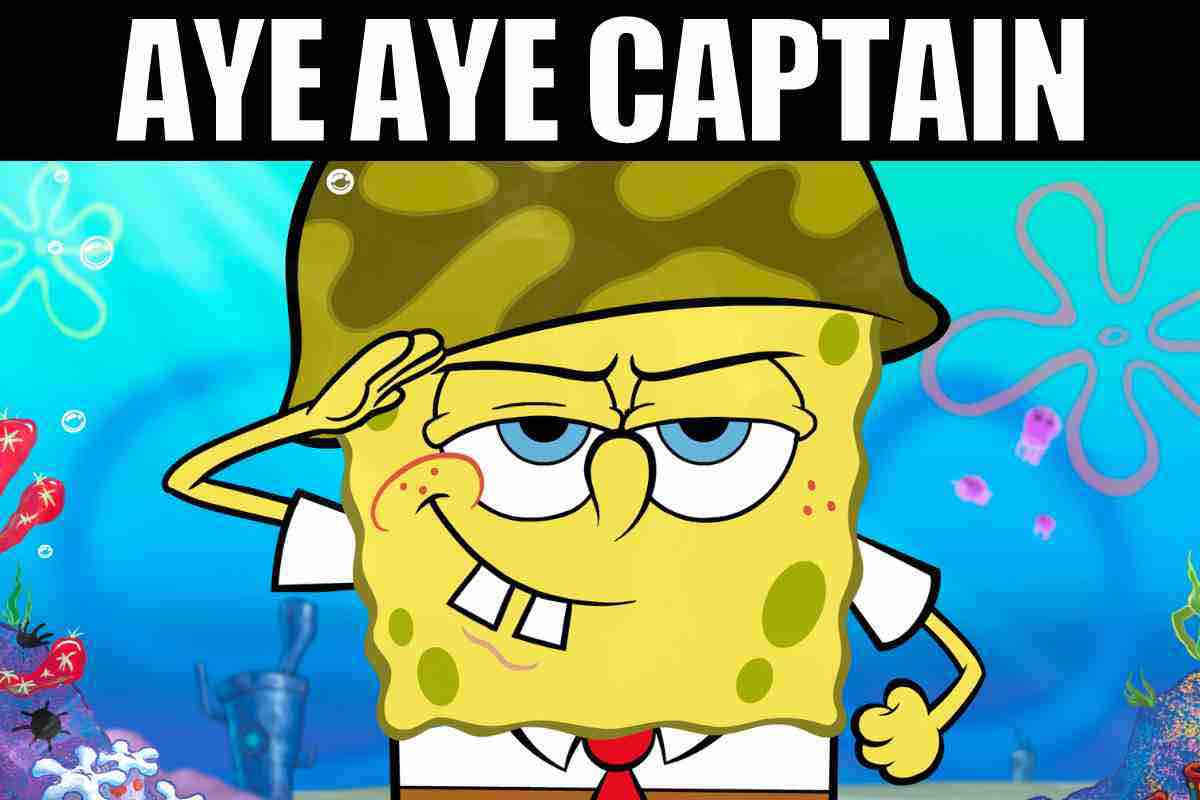Aye Aye Captain Meaning: Unraveling The Nautical Phrase
The phrase "aye aye captain" has sailed through the seas of popular culture, often evoking images of brave sailors and adventurous voyages across the open water. This expression carries a weighty significance, rooted deeply in maritime tradition. To understand its meaning, we must dive into the world of nautical language and customs. As we explore the "aye aye captain meaning," we will uncover its origins, usage, and relevance in modern times, allowing us to appreciate its rich context.
In the realm of seafaring, communication is key. The phrase serves not only as a response but also as a signal of respect and obedience to a commanding officer on a ship. Sailors have relied on such expressions to ensure that orders are understood and followed promptly. By examining "aye aye captain meaning," we will also reflect on how such phrases have permeated popular culture, influencing various forms of media, entertainment, and even everyday language.
As we embark on this linguistic journey, we will unravel the nuances of the phrase, shedding light on how it has evolved over time and its significance beyond the oceans. Whether you are a seafaring enthusiast, a lover of nautical lore, or simply curious about the phrase that has become a staple in our cultural lexicon, this exploration of "aye aye captain meaning" promises to be both enlightening and entertaining.
What is the Origin of "Aye Aye Captain"?
The phrase "aye aye captain" originates from the language and customs of sailors. "Aye" is a term that means "yes" or "affirmative," while "aye aye" serves as an emphatic form of agreement. This expression is often used in response to a captain's orders, indicating that the order has been understood and will be carried out.
How is "Aye Aye Captain" Used in Maritime Context?
In the maritime context, "aye aye captain" is a crucial part of communication on board a ship. When a captain gives an order, a crew member's response of "aye aye" signifies that they have heard the command and will act on it. This phrase is essential for maintaining order and ensuring that all crew members are on the same page during critical moments at sea.
Why is the Phrase Important to Sailors?
The importance of "aye aye captain" extends beyond mere compliance. It fosters a sense of camaraderie and trust among the crew, reinforcing the hierarchy essential for the safe operation of a vessel. The phrase not only conveys obedience but also reflects the crew's commitment to their duties and responsibilities.
How Has "Aye Aye Captain" Influenced Popular Culture?
"Aye aye captain" has transcended its nautical roots, finding its way into various forms of popular culture. From films to television shows, the phrase is often used to evoke a sense of adventure or authority. Iconic characters, such as the beloved cartoon character SpongeBob SquarePants, frequently use this expression, further embedding it into the cultural consciousness.
What Are Some Common Misconceptions About "Aye Aye Captain"?
Despite its widespread use, there are several misconceptions surrounding the phrase "aye aye captain." One common mistake is assuming that it is synonymous with "yes, sir." While both phrases signify agreement, "aye aye" carries the added implication of action. It is not just a simple acknowledgment but a commitment to carry out the order given.
How Can We Use "Aye Aye Captain" in Everyday Life?
In today's context, "aye aye captain" can be playfully used in various scenarios, not just limited to maritime situations. Here are some ways to incorporate it into everyday life:
- As a lighthearted response to a friend's request.
- During team meetings to affirm your commitment to a task.
- In family dynamics, when agreeing to follow a parent's instructions.
- As a humorous way to acknowledge authority in casual conversations.
What is the Cultural Significance of "Aye Aye Captain"?
The cultural significance of "aye aye captain" lies in its embodiment of respect, duty, and adventure. It represents the spirit of exploration and the bond between crew members on a ship. As we navigate through life's challenges, this phrase reminds us of the importance of teamwork and communication, whether on land or at sea.
In What Other Contexts Can We Find Similar Expressions?
Similar expressions can be found in various cultures, often reflecting themes of obedience and respect. Some examples include:
- "Yes, sir" in military contexts.
- "Roger that" in aviation and communication.
- "Understood" in professional environments.
Conclusion: Embracing the "Aye Aye Captain Meaning"
As we conclude our exploration of "aye aye captain meaning," it is clear that this phrase carries a wealth of significance, both in its nautical origins and its presence in popular culture. Understanding its meaning enriches our appreciation of communication and camaraderie, whether on the high seas or in our everyday lives. So, the next time you hear someone say "aye aye captain," take a moment to reflect on the rich history and cultural implications behind this iconic phrase.



ncG1vNJzZmixn6PAtr7IZqWeq6RjsLC5jq2pnqaUnruofY6asJ5lka6ybq%2FAqauaoZ5iuqatzaKloGaYqbqt